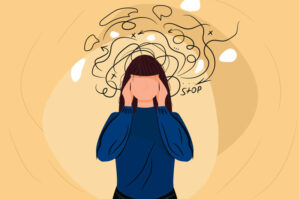Obsessive-compulsive Disorder (OCD) is a common mental health issue characterized by intrusive, negative thoughts and behaviors that manifest as a result of those thoughts. An individual may feel compelled to perform certain tasks or rituals to manage their anxiety or fear, which can interfere with day-to-day life. While there is no cure for OCD, there are activities and treatments available that can help reduce the frequency and intensity of the negative thoughts associated with the disorder. In this blog post, we will discuss OCD negative thoughts treatment methods, including cognitive behavior therapy and mindfulness techniques.
Contents
What Are OCD Negative Thoughts?

OCD Negative thoughts are irrational, intrusive thoughts that can cause distress and anxiety. They can range from fears of contamination to worries about harm coming to a loved one or obsessive doubts over seemingly insignificant decisions. These thoughts may be accompanied by intense emotions and physical sensations such as heart palpitations, sweating, or shortness of breath. The individual might also feel compelled to engage in compulsions such as washing their hands excessively or checking locks multiple times.
OCD Negative thoughts often lead to extreme levels of distress that interfere with day-to-day functioning. It is important to understand how OCD works so you can take steps toward managing the condition and living a healthier lifestyle. Treatment options such as cognitive-behavioral therapy (CBT) are effective in helping individuals manage their intrusive thoughts and reduce distress. With the right support, it is possible to find relief from OCD Negative thoughts and live a more peaceful life.
The main takeaway here is that if you are struggling with OCD Negative thoughts, there is hope. It’s important to seek help from a qualified mental health professional who can provide evidence-based treatments such as CBT. Doing so can help you gain control over your thoughts and lead a happier, healthier life.
Tips For Dealing With OCD Negative Thoughts

OCD negative thoughts treatment can be difficult and frustrating. However, there are some things that you can do to help ease the symptoms. Below are five tips for treating OCD negative thoughts:
Identify Your Triggers
One of the most common triggers of OCD thoughts is stress. Identifying the sources of your stress can help you manage it more effectively and reduce how often your intrusive thoughts occur. Some of the triggers that may cause stress include deadlines, social situations, financial issues, health concerns, or even strong emotions.
Challenge Your Thoughts and Reframe Your Thinking
When you have intrusive thoughts related to OCD, it can be helpful to challenge them. Instead of believing that the thoughts are true, try reframing your thinking by replacing negative beliefs with more positive and realistic ones. Challenging your thoughts can help you reduce your distress and gain more control over your symptoms.
Practice Mindfulness
Mindfulness is a type of meditation that involves focusing on the present moment without judgment or criticism. Practicing mindfulness can help you become aware of when obsessive thoughts are occurring and learn to let go of them without becoming overwhelmed or anxious. You can practice mindfulness with guided meditations, apps, or other resources available online.
Limit Exposure to Negative Stimuli
Being exposed to negative media such as news stories, TV shows, movies, or advertisements can trigger OCD’s negative thoughts. To reduce this risk, try limiting your exposure to these types of stimuli and focusing instead on things that bring you joy and peace. The more positive stimuli you expose yourself to, the less likely you are to be triggered by intrusive thoughts.
Seek Professional Help
If your OCD symptoms are severe and you feel that they are interfering with your daily life, it is important to seek professional help from a mental health specialist. These professionals can provide resources, treatments, and strategies that will help you manage your symptoms more effectively. Your treatment plan may include cognitive-behavioral therapy (CBT), medications, or both.
No matter what approach you take for treating OCD’s negative thoughts, remember that it is possible to lead a healthy and fulfilling life despite having this disorder. With patience and persistence, these techniques can help reduce distress. These are caused by obsessing over anxious thoughts and engaging in compulsive behaviors.
Treatment Methods For OCD Negative Thoughts

There are many treatable methods available for OCD negative thoughts.
No matter which treatment approach you choose for managing OCD negative thoughts. It is important to remember that recovery from this disorder takes time and patience.
Some of the treatment methods for OCD negative thoughts are:
Cognitive Behavioral Therapy
One of the most common treatments for OCD is cognitive behavioral therapy (CBT). This is based on the premise that thoughts, feelings, and behaviors all interact with each other. CBT helps individuals identify and challenge distorted thinking patterns, such as catastrophic thinking or unhelpful assumptions. This type of therapy also works to change unhealthy behavior patterns by focusing on re-shaping negative thought processes in a more positive direction.
Exposure and Response Prevention (ERP)
Exposure and response prevention (ERP) is another type of treatment that can be used to challenge compulsions associated with obsessive thoughts. In this form of therapy, patients are exposed to their fear triggers and then taught how to respond or cope without performing compulsive rituals to reduce anxiety.
Medications
Certain medications, such as selective serotonin reuptake inhibitors (SSRIs), can be prescribed to help manage OCD symptoms. SSRIs are believed to increase the levels of serotonin in the brain and reduce obsessive thoughts. Other types of medication, such as antipsychotics or benzodiazepines, may also be used in conjunction with therapy to treat OCD.
Alternative Treatments
Alternative treatments for OCD negative thoughts include mindfulness-based cognitive behavioral therapy and relaxation techniques, such as progressive muscle relaxation (PMR). These treatments focus on reducing stress and anxiety by teaching individuals how to recognize their triggers and respond differently.
Yoga
Yoga is a form of exercise that can help reduce symptoms of anxiety and depression. It involves stretching, postures, controlled breathing exercises, and meditation to promote physical and mental relaxation. Practicing yoga regularly may help reduce the intensity of OCD negative thoughts as well as improve overall well-being.
Nutrition
Nutrition plays an important role in the management of OCD symptoms. Eating a balanced diet with plenty of fresh fruits, vegetables, whole grains, lean proteins, and healthy fats can help provide vitamins and minerals. This is to support both mental and physical health. Additionally, avoiding processed foods or sugar-laden snacks is recommended for those managing OCD symptoms to avoid exacerbating them.
Support Groups
Joining a therapist-led support group can be an effective way to manage OCD’s negative thoughts. Support groups provide a safe space for individuals to share their experiences and gain insight from others who have gone through similar struggles. Additionally, support groups can help foster feelings of connection and understanding. This can be beneficial in helping individuals manage their symptoms.
Overall, there are many methods available for those struggling with OCD negative thoughts treatment. It is important to remember that recovery takes time and patience.
How to Recognize OCD Negative Thoughts?
Many people with OCD have both obsessions and compulsions. However, it is also possible to have either obsessions or compulsions without the other. For example, a person may be obsessed with germs and bacteria but may not feel the need to wash their hands excessively. Or, a person may feel the need to arrange their furniture in a certain way but may not have any specific thoughts or images that trigger this urge.
Some of the ways to recognize OCD negative thoughts include noticing repetitive or obsessive behaviors and being aware of intrusive thoughts. Obsessive behaviors can include checking things like locks and appliances multiple times, arranging objects in a specific order, or washing your hands excessively. Intrusive thoughts may include worries and fears about yourself or others, doubts or superstitions, or repeating certain words or phrases over and over again.
Conclusion
Obsessive-Compulsive Disorder is a serious condition that can have far-reaching implications if not treated correctly. We hope that this article has helped to provide you with the information necessary to combat your OCD negative thoughts and take back control of your life. If left untreated, these thoughts can become more and more detrimental, so it’s important for those suffering from this condition to understand the various forms of treatment available to find an effective solution. With help from qualified professionals, those struggling with Obsessive-Compulsive Disorder can work towards managing their symptoms and living a healthier life.
For more information and guidance, please contact MantraCare. OCD is a mental health disorder characterized by obsessions and compulsions. If you have any queries regarding Online OCD Counseling experienced therapists at MantraCare can help: Book a trial OCD therapy session


